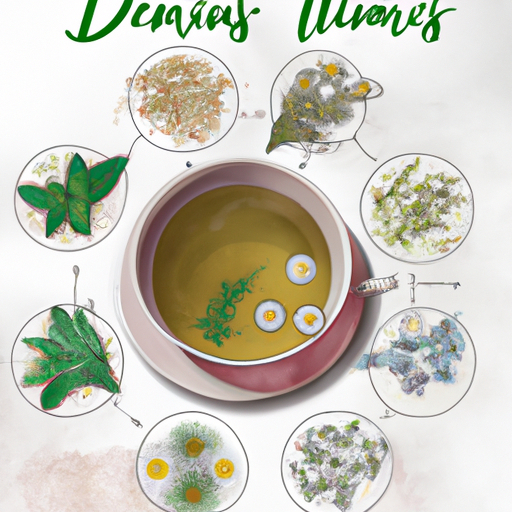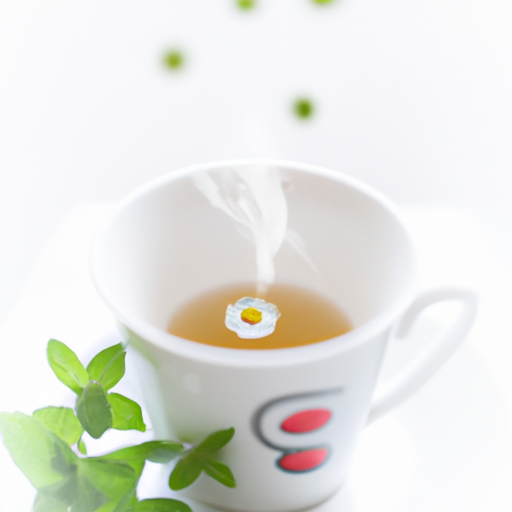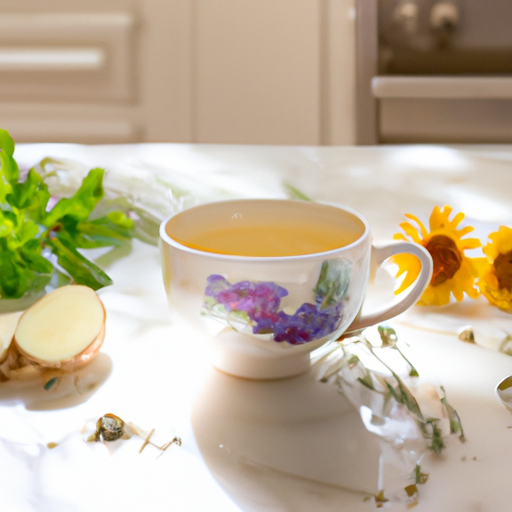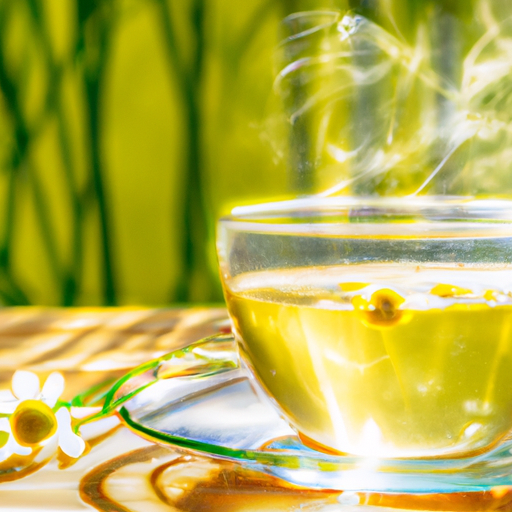You might be thinking, ‘Herbal tea? Can a simple cup of tea really help with stomach bloating?’ Well, let me assure you, it absolutely can!
Stomach bloating is a common discomfort that many of us experience from time to time. Whether it’s caused by overeating, indigestion, or even certain medical conditions, the discomfort is real. But fear not, because nature has provided us with a range of herbal teas that can help ease that bloated feeling.
In this article, we will explore the top herbal teas that have been proven to be effective in reducing stomach bloating. From the refreshing and soothing qualities of peppermint tea to the calming effects of chamomile tea, we will delve into the science behind why these teas work and how they can provide relief.
So, if you’re tired of feeling bloated and uncomfortable, join me as we discover the power of herbal tea in combating stomach bloating. Say goodbye to that distended tummy and hello to a more comfortable and confident you!
Key Takeaways
- Peppermint tea has carminative properties and relaxes gastrointestinal muscles, reducing gas and bloating.
- Chamomile tea is soothing for an upset stomach and alleviates bloating and discomfort.
- Ginger tea has anti-inflammatory properties, stimulates digestive enzymes, and reduces bloating.
- Fennel tea relaxes gastrointestinal muscles, relieves bloating and gas, and supports weight loss.
Peppermint Tea
If you’re looking for a natural way to soothe your bloated belly, look no further than peppermint tea! Peppermint tea has been used for centuries to alleviate digestive discomfort, including stomach bloating.
The benefits of peppermint tea for bloating are twofold. Firstly, peppermint has carminative properties, meaning it helps to relax the muscles of the gastrointestinal tract, reducing gas and bloating. Secondly, peppermint tea has been shown to have an antispasmodic effect, which can help to relieve abdominal cramps and pain associated with bloating.
To make peppermint tea at home, simply steep one teaspoon of dried peppermint leaves in a cup of hot water for about 5 minutes. You can strain the leaves out or leave them in for added flavor.
Now, let’s move on to the next section about chamomile tea.
Chamomile Tea
Chamomile tea is a natural remedy that I find incredibly soothing for an upset stomach. It’s been used for centuries to calm digestive issues and reduce inflammation. Personally, I’ve found that drinking chamomile tea helps to alleviate bloating and discomfort. It’s a go-to option when my stomach is feeling off.
Soothes an Upset Stomach
When you’re feeling bloated, try sipping on a cup of peppermint tea – it’ll soothe your upset stomach and help relieve any discomfort. Peppermint tea is one of the most popular natural remedies for stomach discomfort, thanks to its numerous benefits for digestion. The menthol in peppermint tea has been shown to relax the muscles of the gastrointestinal tract, which can help reduce gas and bloating.
Additionally, peppermint tea has been found to have anti-inflammatory properties, which can further alleviate stomach discomfort. It’s believed that the compounds in peppermint tea can help reduce inflammation in the digestive system, allowing for better digestion and minimizing bloating.
So, if you’re looking for a natural and effective way to ease stomach bloating, reach for a cup of soothing peppermint tea.
Reduces Inflammation and Bloating
Peppermint tea’s anti-inflammatory properties help soothe and calm the digestive system, reducing discomfort and swelling. It is one of the best natural remedies for stomach bloating. Here are four reasons why peppermint tea is a great choice for reducing inflammation and bloating:
- Peppermint tea contains menthol, which relaxes the muscles of the gastrointestinal tract, easing digestion and preventing bloating after meals.
- The tea has carminative properties, meaning it helps to expel gas from the digestive system, relieving bloating and discomfort.
- Peppermint tea can help prevent the formation of excess gas in the stomach by reducing the production of gas-inducing enzymes.
- It also acts as a natural antispasmodic, helping to reduce cramping and spasms in the digestive system that can contribute to bloating.
Transitioning to the next section, ginger tea is another herbal remedy that can help alleviate stomach bloating.
Ginger Tea
Ginger tea is like a warm, soothing hug for your bloated stomach. It not only tastes delicious, but it also offers a variety of health benefits. Ginger has been used for centuries to treat digestive issues, including bloating and inflammation. Studies have shown that ginger has anti-inflammatory properties, which can help reduce the uncomfortable swelling in your stomach. Additionally, ginger tea can help improve digestion by stimulating the production of digestive enzymes.
To make homemade ginger tea, simply slice a piece of fresh ginger root and steep it in hot water for about 10 minutes. Add a squeeze of lemon and a teaspoon of honey for added flavor.
Now let’s move on to the next stomach-soothing herbal tea: fennel tea.
Fennel Tea
Fennel tea, with its unique licorice-like flavor, offers a comforting and naturally soothing option for those looking to ease digestive discomfort. This herbal tea has been used for centuries due to its potential health benefits and minimal side effects.
Here are some benefits of fennel tea:
-
Relieves bloating and gas: Fennel tea can help relax the muscles in the gastrointestinal tract, reducing bloating and relieving gas.
-
Eases indigestion: Fennel tea has carminative properties, which means it can help alleviate indigestion and promote healthy digestion.
-
Supports weight loss: Fennel tea can act as an appetite suppressant and may help boost metabolism, making it a useful addition to a weight loss regimen.
To make fennel tea at home, simply steep one teaspoon of crushed fennel seeds in hot water for about 10 minutes. Strain and enjoy.
Now, let’s explore the benefits and preparation of lemon balm tea.
Lemon Balm Tea
After discussing the benefits of Fennel Tea, let’s move on to another herbal tea that can help with stomach bloating: Lemon Balm Tea.
Lemon balm, also known as Melissa officinalis, is a herb that’s been used for centuries to soothe digestive discomfort and reduce bloating. This aromatic tea not only has a pleasant lemony flavor but also offers various health benefits.
Lemon balm tea can help relax the muscles of the digestive tract, which can alleviate bloating and cramping. It also has anti-inflammatory properties, which can further aid in reducing bloating.
To make lemon balm tea at home, simply steep a handful of fresh lemon balm leaves in hot water for about 10 minutes. Strain and enjoy.
Now, let’s dive into the next herbal tea for stomach bloating: dandelion tea.
Dandelion Tea
With its vibrant yellow petals and earthy taste, dandelion tea sweeps away discomfort, unveiling a refreshing and invigorating remedy. This herbal infusion has been cherished for centuries due to its numerous health benefits.
Dandelion tea is known for its detoxifying properties, assisting the body in eliminating harmful toxins and reducing bloating. It acts as a natural diuretic, promoting urine production and reducing water retention, thus alleviating that uncomfortable feeling of bloating.
Incorporating dandelion tea into your daily routine can help restore balance to your digestive system and provide relief from stomach bloating. Additionally, its detoxifying properties can contribute to overall wellness and assist in weight management.
So, as we move on to explore the benefits of a peppermint and ginger blend, let’s continue this journey towards finding the perfect herbal tea remedy for stomach bloating.
Peppermint and Ginger Blend
After discussing the potential benefits of dandelion tea for stomach bloating, let’s move on to another herbal tea option that may help alleviate this uncomfortable condition: a peppermint and ginger blend. Peppermint has long been used for its medicinal properties, including its ability to soothe digestive issues such as bloating and gas. It contains menthol, which helps relax the muscles of the gastrointestinal tract, reducing spasms and promoting smooth digestion. Ginger, on the other hand, has been used for centuries to treat various digestive disorders. It has anti-inflammatory properties that can help reduce bloating and improve digestion. Combining these two powerful ingredients in a tea blend can provide a refreshing and effective solution for stomach bloating. Take a look at the table below to see a comparison of their health benefits:
| Peppermint | Ginger |
|---|---|
| Relieves indigestion | Reduces nausea |
| Alleviates abdominal pain | Boosts immunity |
| Reduces bloating and gas | Eases menstrual cramps |
| Improves breath freshness | Supports brain health |
Incorporating a peppermint and ginger blend into your daily routine may not only help relieve stomach bloating but also provide additional health benefits.
Frequently Asked Questions
Can herbal teas completely eliminate stomach bloating?
Herbal teas have various benefits, including relieving stomach bloating. While they may not completely eliminate bloating, they can provide natural remedies that help soothe the digestive system and reduce discomfort.
Are there any potential side effects or risks associated with drinking herbal teas for stomach bloating?
Potential risks and side effects of drinking herbal teas for stomach bloating include allergic reactions, interactions with medications, and digestive issues. It is important to consult with a healthcare professional before using herbal teas for any medicinal purposes.
Can pregnant women drink herbal teas for stomach bloating?
Pregnant women can safely incorporate herbal teas into their diet to relieve stomach bloating. Herbal teas offer various benefits, such as reducing inflammation and promoting digestion. However, it’s essential to consult a healthcare professional before making any dietary changes during pregnancy.
How frequently should I drink herbal teas to see the desired results in reducing stomach bloating?
To achieve desired results in reducing stomach bloating, I recommend drinking herbal teas regularly. Consistency is key! By incorporating them into your daily routine, you can experience the full effectiveness of these natural remedies.
Are there any specific dietary or lifestyle changes that should be followed along with drinking herbal teas for stomach bloating?
To reduce stomach bloating, it is important to make dietary changes such as avoiding gas-producing foods and incorporating more fiber-rich options. Additionally, adopting a healthier lifestyle by exercising regularly and managing stress can also help alleviate bloating.
Conclusion
In conclusion, when it comes to soothing stomach bloating, herbal teas can be a gentle and comforting remedy. From the refreshing peppermint tea to the calming chamomile tea, there are various options to choose from. The warming ginger tea and the digestive-promoting fennel tea can also provide relief. Lemon balm tea offers a soothing and uplifting experience, while dandelion tea aids in digestion. And for a delightful blend, combining peppermint and ginger can be a great choice. Embrace the power of these herbal teas to ease your stomach bloating discomfort.










